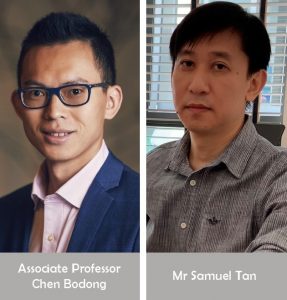Young Children’s Voices in Mathematical Problem Solving
Contributed by Dr Ho Siew Yin and Sng Wei Qin Abbie, from NTUC First Campus, for SingTeach Virtual […]
Read More
Knowledge building has provided a new approach towards teaching and learning in the 21st century. At least, this is the sentiment that resonates with Associate Professor Chen Bodong from the University of Minnesota and Mr Samuel Tan, Senior Specialist from the Singapore Ministry of Education’s Educational Technology Division. They share with SingTeach how knowledge building is changing and influencing the way we teach and learn.

The knowledge building (KB) approach encourages students to think like experts, and learn by forming and building on each other’s ideas, describes Bodong, whose research interests lie in the areas of ICT in education and learning analytics.
It brings students together to brainstorm and collaborate, which he finds very intriguing. “KB presented itself as an interesting educational approach that was very different from my experiences as a student back in school,” he shares.
According to Samuel, KB is “a principle-based innovation where KB principles form the blueprint for teachers’ design, strategies and facilitation.” His current involvement in KB research, through the Ministry of Education’s (MOE) Senior Specialist Track Research Fund (SSTRF), supports teachers to make sense of the KB principles through co-designing lessons, analysing and utilizing their students’ ideas and theories to drive the KB process.
A community is important so as to help create an environment that allows KB to happen.
“Before KB can happen, we need to admit that it is an uphill task to create an authentic KB environment in schools,” says Bodong. “It requires support from all the stakeholders in the school to be willing to adjust and to take risk; this includes principals, teachers, parents and students.”
This KB community gathers perspectives from multiple fields of education research and envisage the possibility of what education could be, explains Bodong. “As such, the KB community views the school as a knowledge-creating organization that cultivates values such as critical thinking, problem-solving, interdisciplinary thinking, decision making, collaboration and leadership.”
“The community that we have in KB extends to include students and other KB classes across different schools and even countries,” Samuel adds.
As part of the KB community in Singapore, on top of connecting practitioners who are interested in KB, Samuel also actively knowledge build with these teachers as part of his efforts to bring knowledge creation practices into schools.
The MOE SSTRF helps him to carry out research to advance MOE’s knowledge base and to fulfil its objectives, for example, by leading projects in KB science classrooms to improve scientific explanations and self-regulation amongst students.
Bodong believes that teachers should be encouraged to inquire about their teaching, to collaborate and to refine their teaching craft. Research-practice partnerships can also create productive spaces for teachers, researchers, and engineers to co-design digital innovations and teaching strategies to support KB, he opines.
“These partnerships will be the drivers that introduce KB into schools, create technological innovations and conduct empirical research about teaching and learning,” explains Bodong. “By doing so, we are forming ‘hubs of innovation’ around the world that may lead to a series of meaningful changes in education.”
In the Singapore context, the SkillsFuture for Educators initiative supports teachers to develop higher levels of practice in e-pedagogy, which is the practice of teaching with technology for active learning. Samuel’s work as a senior specialist focuses on the design and pedagogical use of learning analytics and visualizations to support KB discourse and processes.
With home-based and blended learning set to be a regular part of schooling in Singapore, MOE hopes to develop self-directed and independent learners who are passionate and intrinsically motivated to learn. “KB, with its focus on community knowledge advancement, sustained inquiry and engaging students’ ideas, presents a compelling picture of what school and education could be,” Samuel shares.
“KB, with its focus on community knowledge advancement, sustained inquiry and engaging students’ ideas, presents a compelling picture of what school and education could be.”
– Samuel, on how KB can nurture self-directed and independent learners
Bodong and his research team work closely with educators to co-design new technologies that extend students’ capabilities in areas such as data science, and invite them to solve complex issues like climate change. Rigorous studies are also conducted in the classrooms to evaluate the effectiveness of such initiatives.
“Currently, KB research has entered its third decade and it has shown that we need to invest in building research-practice partnerships to make sustainable improvements in education,” Bodong shares.
When asked about the digital environment in relation to KB research and practice, Samuel is confident that KB is able to transcend the various digital platforms that may surface over time, including the Student Learning Space. “The design principles enable teachers and students to bring their practice and adaptability into any platform, and be effective in improving ideas and applying that knowledge in multiple novel contexts,” he says.
Through KB, students not only develop deep conceptual understanding, but also participate in the practices of knowledge creating communities regardless of the platform used.
Bodong adds that the Singapore education system is innovative and forward-looking, having met Singaporean scholars who are important leaders in the KB international community, such as Dr Teo Chew Lee who is also the guest editor of this issue of SingTeach and Senior Research Scientist at NIE, Singapore.
As Bodong affirms: “Singapore has started writing its own KB stories that can contribute to education research.”